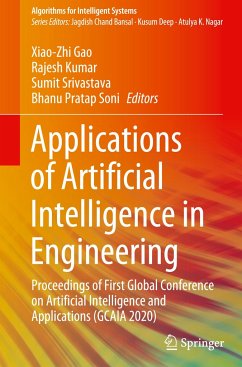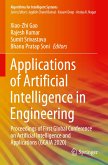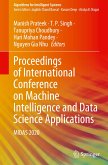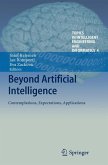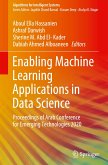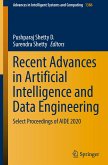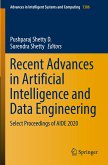Applications of Artificial Intelligence in Engineering
Proceedings of First Global Conference on Artificial Intelligence and Applications (GCAIA 2020)
Herausgegeben:Gao, Xiao-Zhi; Kumar, Rajesh; Srivastava, Sumit; Soni, Bhanu Pratap
Applications of Artificial Intelligence in Engineering
Proceedings of First Global Conference on Artificial Intelligence and Applications (GCAIA 2020)
Herausgegeben:Gao, Xiao-Zhi; Kumar, Rajesh; Srivastava, Sumit; Soni, Bhanu Pratap
- Gebundenes Buch
- Merkliste
- Auf die Merkliste
- Bewerten Bewerten
- Teilen
- Produkt teilen
- Produkterinnerung
- Produkterinnerung
This book presents best selected papers presented at the First Global Conference on Artificial Intelligence and Applications (GCAIA 2020), organized by the University of Engineering & Management, Jaipur, India, during 8-10 September 2020. The proceeding will be targeting the current research works in the domain of intelligent systems and artificial intelligence.
Andere Kunden interessierten sich auch für
![Applications of Artificial Intelligence in Engineering Applications of Artificial Intelligence in Engineering]() Applications of Artificial Intelligence in Engineering208,99 €
Applications of Artificial Intelligence in Engineering208,99 €![Proceedings of International Conference on Machine Intelligence and Data Science Applications Proceedings of International Conference on Machine Intelligence and Data Science Applications]() Proceedings of International Conference on Machine Intelligence and Data Science Applications223,99 €
Proceedings of International Conference on Machine Intelligence and Data Science Applications223,99 €![Beyond Artificial Intelligence Beyond Artificial Intelligence]() Beyond Artificial Intelligence75,99 €
Beyond Artificial Intelligence75,99 €![Enabling Machine Learning Applications in Data Science Enabling Machine Learning Applications in Data Science]() Enabling Machine Learning Applications in Data Science149,99 €
Enabling Machine Learning Applications in Data Science149,99 €![Recent Advances in Artificial Intelligence and Data Engineering Recent Advances in Artificial Intelligence and Data Engineering]() Recent Advances in Artificial Intelligence and Data Engineering245,99 €
Recent Advances in Artificial Intelligence and Data Engineering245,99 €![Recent Advances in Artificial Intelligence and Data Engineering Recent Advances in Artificial Intelligence and Data Engineering]() Recent Advances in Artificial Intelligence and Data Engineering245,99 €
Recent Advances in Artificial Intelligence and Data Engineering245,99 €![Toward Humanoid Robots: The Role of Fuzzy Sets Toward Humanoid Robots: The Role of Fuzzy Sets]() Toward Humanoid Robots: The Role of Fuzzy Sets171,99 €
Toward Humanoid Robots: The Role of Fuzzy Sets171,99 €-
-
-
This book presents best selected papers presented at the First Global Conference on Artificial Intelligence and Applications (GCAIA 2020), organized by the University of Engineering & Management, Jaipur, India, during 8-10 September 2020. The proceeding will be targeting the current research works in the domain of intelligent systems and artificial intelligence.
Produktdetails
- Produktdetails
- Algorithms for Intelligent Systems
- Verlag: Springer / Springer Nature Singapore / Springer, Berlin
- Artikelnr. des Verlages: 978-981-33-4603-1
- 1st edition 2021
- Seitenzahl: 960
- Erscheinungstermin: 11. Mai 2021
- Englisch
- Abmessung: 241mm x 160mm x 57mm
- Gewicht: 1584g
- ISBN-13: 9789813346031
- ISBN-10: 9813346035
- Artikelnr.: 60470390
- Herstellerkennzeichnung
- Springer-Verlag GmbH
- Tiergartenstr. 17
- 69121 Heidelberg
- ProductSafety@springernature.com
- Algorithms for Intelligent Systems
- Verlag: Springer / Springer Nature Singapore / Springer, Berlin
- Artikelnr. des Verlages: 978-981-33-4603-1
- 1st edition 2021
- Seitenzahl: 960
- Erscheinungstermin: 11. Mai 2021
- Englisch
- Abmessung: 241mm x 160mm x 57mm
- Gewicht: 1584g
- ISBN-13: 9789813346031
- ISBN-10: 9813346035
- Artikelnr.: 60470390
- Herstellerkennzeichnung
- Springer-Verlag GmbH
- Tiergartenstr. 17
- 69121 Heidelberg
- ProductSafety@springernature.com
Xiao-Zhi Gao received his B.Sc. and M.Sc. degrees from the Harbin Institute of Technology, China, in 1993 and 1996, respectively. He obtained his D.Sc. (Tech.) degree from the Helsinki University of Technology (now Aalto University), Finland, in 1999. He has been working as Professor at the University of Eastern Finland, Finland, since 2018. He is also Guest Professor at the Harbin Institute of Technology, Beijing Normal University and Shanghai Maritime University, China. Prof. Gao has published more than 400 technical papers in refereed journals and international conferences. His current Google Scholar H-index is 30. His research interests are nature-inspired computing methods with their applications in optimization, data mining, machine learning, control, signal processing and industrial electronics. Dr. Rajesh Kumar received his B.Tech. degree from NIT Kurukshetra, India, the M. Tech. degree in Power System and the Ph.D. degree in Intelligent Systems MNIT, Jaipur. He was Postdoctorate Research Fellow in the Department of Electrical and Computer Engineering at the National University of Singapore (NUS), Singapore, from 2009 to 2011. Currently, he has been working as Professor with the Department of Electrical Engineering, MNIT, Jaipur. Dr. Kumar research interests focus on intelligent systems, machine intelligence, power management, smart grid and robotics. Dr. Kumar has published over 450 research articles, has supervised 20 Ph.D. and more than 30 M.Tech. thesis. He has 12 patents to his name. He received 03 academic awards, 12 best paper awards, 06 best thesis awards, 04 professional awards and 25 student awards. He has received the Career Award for Young Teachers in 2002 from the Government of India. He is on 12 Journal Editorial Boards. He is Associate Editor of IEEE Access, IEEE ITeN (Industrial Electronics technology News), Associate Editor, Swarm and Evolutionary Computation, Elsevier, Associate Editor, IET Renewable and Power Generation, Associate Editor, IET Power Electronics, Associate Editor, International Journal of Bio Inspired Computing, and Deputy Editor-in-Chief, CAAI Transactions on Intelligence Technology, IET. Dr. Kumar is Senior Member of IEEE (USA), Fellow of IET (UK), Fellow of IE (INDIA), Fellow of IETE, Life Member of CSI, Senior Member of IEANG and Life Member of ISTE. He was Honorary Secretary of IETE Rajasthan Chapter and Excom IEEE Delhi PES-IAS. Currently, he is Vice Chairman of IEEE Rajasthan Subsection. Sumit Srivastava is currently Professor in the Department of Information Technology, Manipal University Jaipur (MUJ). He was holding the post of Head of the Department of Information Technology and recently promoted to Controller of Examination at MUJ. He has done his MCA from BITS, Mesra, Ranchi, and Ph.D. in Data Mining from the University of Rajasthan. He has 17 years of Teaching and nearly 12 years of Research Experience. Dr. Sumit has alsobeen an invited speaker in the area of algorithms, machine learning, and information & knowledge discovery at various short-term courses. He has published around 85+ research papers in SCI, Scopus & peer-reviewed journals and conferences of international repute. He is currently Senior Member of IEEE, CSI & ACM and has been associated with various scientific societies as Member. He is also serving as Editorial Member in Springer Journal of Image Processing & Computer Vision, Guest Editor in Wiley Journal of Computer Vision, Reviewer in Journal of Imaging & Sensing and Journal of Computing and Communication and also Convener for the two international conferences of Smart System, Innovation and Computing (SSIC) in collaboration with Springer. Bhanu Pratap Soni received the Bachelor of Technology with honors in Electrical Engineering and Master of Technology degree with honors in Power System Engineering from the Rajasthan Technical University, Kota, India, in the years 2011 and 2014, respectively, and submitted his thesis in Intelligent Power Systems for Ph.D. degree at the Department of Electrical Engineering, Malaviya National Institute of Technology (MNIT) Jaipur, India, in 2019. He is currently Associate Professor at the Department of Electrical Engineering at the University of Engineering and Management, Jaipur. He has received Young Scientist Award (under ITS, SERB) in 2018 from the Department of Science Technology, Govt. of India. He has also worked as Research Associate from 2015 to 2018 at the Department of Electrical Engineering, Malaviya National Institute of Technology, Jaipur. He is currently Member of IEEE and IACSIT and has been associated with various scientific societies as Member. He has published around 40+ research papers in SCI, Scopus & peer-reviewed journals and conferences of national and international repute. He is also serving as Reviewer in Applied Soft Computing, Cogent Engineering, International Transactions on Electrical Energy Systems and Scientia Iranica. He has also worked as Associate Chief Editor of Proceedings of 2nd International Conference on Advance Trends in Engineering & Technology (ICATET-2014), ACEIT, Jaipur, India. His background is in the field of artificial intelligence and machine learning, optimization, power system stability, smart grid, optimization and deep learning.
Application of Supervised learning for Voltage Stability Assessment.- Breast DCE-MRI Segmentation for Lesion Detection using Clustering with Fireworks Algorithm.- Swarm Programming Using Moth-Flame Optimization and Whale Optimization Algorithms.- Nonlinear Regression Analysis Using Multi-Verse Optimizer.- An Extended ACO-Based Routing Algorithm for Cognitive Radio Network.- A Review on Image Classification and Object Detection Using Deep Learning.- Kidney Lesion Segmentation in MRI Using Clustering with Salp Swarm Algorithm.- Smart Approach to Optical Character Recognition and Ubiquitous Speech Synthesis using Real-Time Deep Learning Algorithms.- Sine Cosine Algorithm with Centroid Opposition-based Computation.- Data Mining Techniques for Fraud Detection - Credit Card Frauds.
Application of Supervised learning for Voltage Stability Assessment.- Breast DCE-MRI Segmentation for Lesion Detection using Clustering with Fireworks Algorithm.- Swarm Programming Using Moth-Flame Optimization and Whale Optimization Algorithms.- Nonlinear Regression Analysis Using Multi-Verse Optimizer.- An Extended ACO-Based Routing Algorithm for Cognitive Radio Network.- A Review on Image Classification and Object Detection Using Deep Learning.- Kidney Lesion Segmentation in MRI Using Clustering with Salp Swarm Algorithm.- Smart Approach to Optical Character Recognition and Ubiquitous Speech Synthesis using Real-Time Deep Learning Algorithms.- Sine Cosine Algorithm with Centroid Opposition-based Computation.- Data Mining Techniques for Fraud Detection - Credit Card Frauds.

